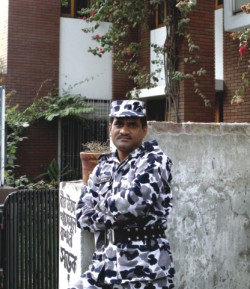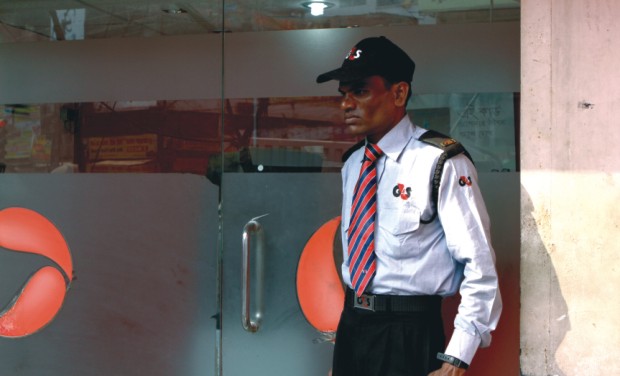|
Human Rights
Security at the Doors
While hundreds of security guards on duty around the country ensure the safety of property and property owners, their standard of living, job security and responsibility have hardly changed over time
Farhana Urmee
Drowsy, Hasan Ali does not spare a single chance to look at the strangers passing him by. If anyone approaches him, he stands up and greets the stranger with respect. Hasan seldom tries to judge strangers as good or bad guys based on their appearances. It is his job to keep watch, not to pass judgment on visitors.
Around the country, hundreds of security guards are on duty 24/7 to ensure that unwanted visitors are barred from entering a certain area or building and they make it sure that everything is going good. Uniform holder Hasan Ali, a security guard at a private bank's ATM booth is well aware of his duty and his presence at the door makes the client of that particular bank feel safe, while receiving service from the ATM booth.
 |
Around the country, hundreds of security guards are on
duty 24/7 to ensure that unwanted visitors are barred
from entering a certain area or building. |
Although Hasan Ali is keeping watch on a bank's ATM booth, he is not an employee of the bank rather he works for an agency that supplies security guards to different organisations and apartments. Before taking the job of a security guard, Hasan Ali tried a number of professions to earn a better living for him and his family. Unfortunately, even his present job as a security guard, that he has been doing for the last 15 months, cannot provide him with a good salary and other job benefits that he was looking for.
Earlier, 30-year-old Hasan Ali used to work as a day labourer at his home town in Dinajpur and then left his birthplace for a better life. Reaching the capital, he first worked as a daily meal supplier at a bachelors' mess but that job could not help him to run his six-member family, with its meagre income. So he started to pull rickshaw, giving his father the responsibility to run the business. Eventually he changed his mind and managed to get the job of a security guard.
At present Hasan earns Tk 3000 on a monthly basis, working as security guard for eight hours a day. Again, by doing an additional eight hours over time duty he earns around taka three thousands extra. “My job depends only on my attendance at work, if I am here I get the payment, and if I am not, payment is not meant for me. I am still the day labourer, the only difference is that I am wearing a uniform," says Hasan Ali describing his job.
Before joining Ornate security service he worked for another such agency where he had a scope to save a portion of his salary in provident fund. “I had to pay Tk 100 monthly and the ISS authority (the security service that Hasan worked for earlier) added forty percent to my provident fund. I got my money back when I left that job and invested it in my father's business,” says Hasan adding that a provision of provident fund or job benefits like that for poor people in service should be assured. Such provision is unavailable at the company he is currently working for.
Hasan has complained that the companies often take away a good amount of money from the clients for security guards but pays very little to the people who are actually working. Although a security guard's job is to protect life and property of people even risking their own lives, the social and economic conditions of these watchmen are still very poor in the society. “We are ill paid, there is no yearly bonus in this job, moreover a beginner guard has to pay Tk1000-1500 for the uniform he will be wearing while in duty,” says Hasan.
The list of complaints is way longer for some other security guards in the town. Md Baset Ali, a security guard at an apartment in the city's Dhanmondi area, has been working for a company for seven years. Baset started his job for a Tk 2000 monthly salary excluding over time duty bills. And after such a long time within which the country's economy flourished, price-hike hit the market repeatedly and currency lost its value due to inflation, Baset salary increased to Tk 3000 only. Thanks to his employers, he does not have to pay for the uniform he wears.
According to insiders among the service providers there should be multiphase training to enhance the skill of a guard and to make him dependable and well-groomed. The training must include a physical training, orientation of the security devices, course on safety measures and protection. However, Hasan Ali, Baset and his fellow guards were trained only for four days before joining the job.
Mrinal Kanti Biswas, executive director of Black Cat Securicor Ltd says, “As the issue security is a sensitive one, the companies providing security services and supplying guards must be professional in this field. There are instances where unprofessional people come to this business only with their previous experience of being watchmen. This is utterly unexpected.” The companies should bring people for this job with the reference of reliable sources and they must train up the guards to become competent for the job. Many companies just select people randomly, teach them greetings like assalamualaikum, tailor uniform for the guards and employ them; such practice is unprofessional,” continues Biswas.

Some security guards are well trained. Photo: Zahedul I Khan
“There are around 200 such companies providing security guards to different residential, corporate, industrial, travel and VIP protection purposes around the country. All are doing business in their own capacity, which often makes some of them exploit unemployed people by giving them poor salary and limited facilities,” says Biswas. He adds that government must monitor these companies' activities while giving licence and other approvals which might stop some unprofessional companies from making money by using human resource through dishonesty. Above all, the salary and other facilities for the security guards working in different agencies depend on variables like the fitness and qualification of the guards and demand of the client, and contract between the client and company, continues Biswas.
Unlike Baset and Hasan, Russel, a security guard of an educational institute (who is not assigned by any service provider) gets Tk 9,200 monthly for doing the same kind of job. Russell has a provident fun where he has to deposit Tk 475 monthly with the assurance of getting double when he leaves the job. Russell knows the reality of other security guards working under agencies and seems quite satisfied with his current job. He thinks that the government must take into account the problems and possibilities of this profession, set a standard rule for all the agencies and put it into practice to serve the interest of the poorly-paid security guards.
Copyright
(R) thedailystar.net 2010 |
